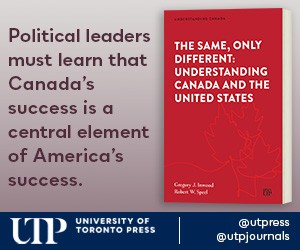Author Robert Calderisi tells the wry story of an Alberta friend who worked eight years in Montréal and never tired of hectoring Haitian cabdrivers by giving his home address in English, “Nun’s Island” instead of Ile-des-Soeurs. “Very few drivers knew what he was talking about,” writes Calderisi. “Instead of letting them off the hook, he would jump into a different taxi, feeling triumphant. I remember hoping that he took a very long time to get home each night. I also knew that if he worked in Poland for eight years he would have learned Polish.”
Québec In A Global Light is no lament. Calderisi is refreshingly candid. After fifty-two years of official bilingualism Canada “is nothing of the sort,” he says: “Few Canadians arriving in Québec do not feel slightly disoriented.”
Authors for generations have made a cottage industry of churning out volumes on “whither Canada” themes of French disaffection and English insensitivity. Québec In A Global Light does nothing of the sort. Calderisi is a skillful writer who examines his home province with affection and a clear eye, as if it were a foreign land. They are like the Afrikaners, the Dutch settlers of South Africa, “obsessed with the survival of their culture in a sea of Others, fighting fossilization and irrelevance,” he writes.
“I hope this book will be revealing, even for those who think they know the subject well, and that it will dispel some misconceptions, just as my research dispelled some of mine,” says Calderisi. He scores on both points. Canadians accustomed to federal cabinet ministers acting as official translators for the two solitudes would be intrigued to learn there is no criticism of Québec that has not been made by a Québecker.
Calderisi quotes a conservative Québec City radio personality: “Each day, the Québec State collapses a little bit more before our eyes, like the Ville-Marie tunnel that runs under the centre of Montréal. Out of shape and out of breath, it seems to be reaching the end of a cycle, with one of the heaviest debt loads in the Western world, one boy out of three dropping out of high school, an average 20-hour wait in what are still called ‘emergency’ wards, a pension system that is running out of money, bureaucratic and trade union practices that are preventing any kind of development, public infrastructure in disrepair, etcetera.”
The provincial debt ratio to GDP is equivalent to the Ivory Coast. The tax system is so dysfunctional forty percent pay no income tax at all. Population growth is so stagnant a million people have left since 1972, and Québec will rate among the grayest provinces by 2040. Calderisi quotes then-Premier Lucien Bouchard’s account of a secret meeting with Standard & Poor’s bond raters in 1996: “I asked them to give us another chance…They answered that Québec had been going its own way for 40 years and the results were hardly brilliant.”
Calderisi proposes remedies, and reminds readers of an attribute known to any visitor who ever attended business in Trois-Rivières or billeted for a hockey tournament at Laval: “Except when they are behind the wheel, they are one of the most civil peoples on earth. And despite their cultural insecurity, Québeckers are generally happy.”
By Holly Doan
Québec In A Global Light: Reaching For The Common Ground, by Robert Calderisi; University of Toronto Press; 224 pages; ISBN 9781-4875-04717; $32.95









